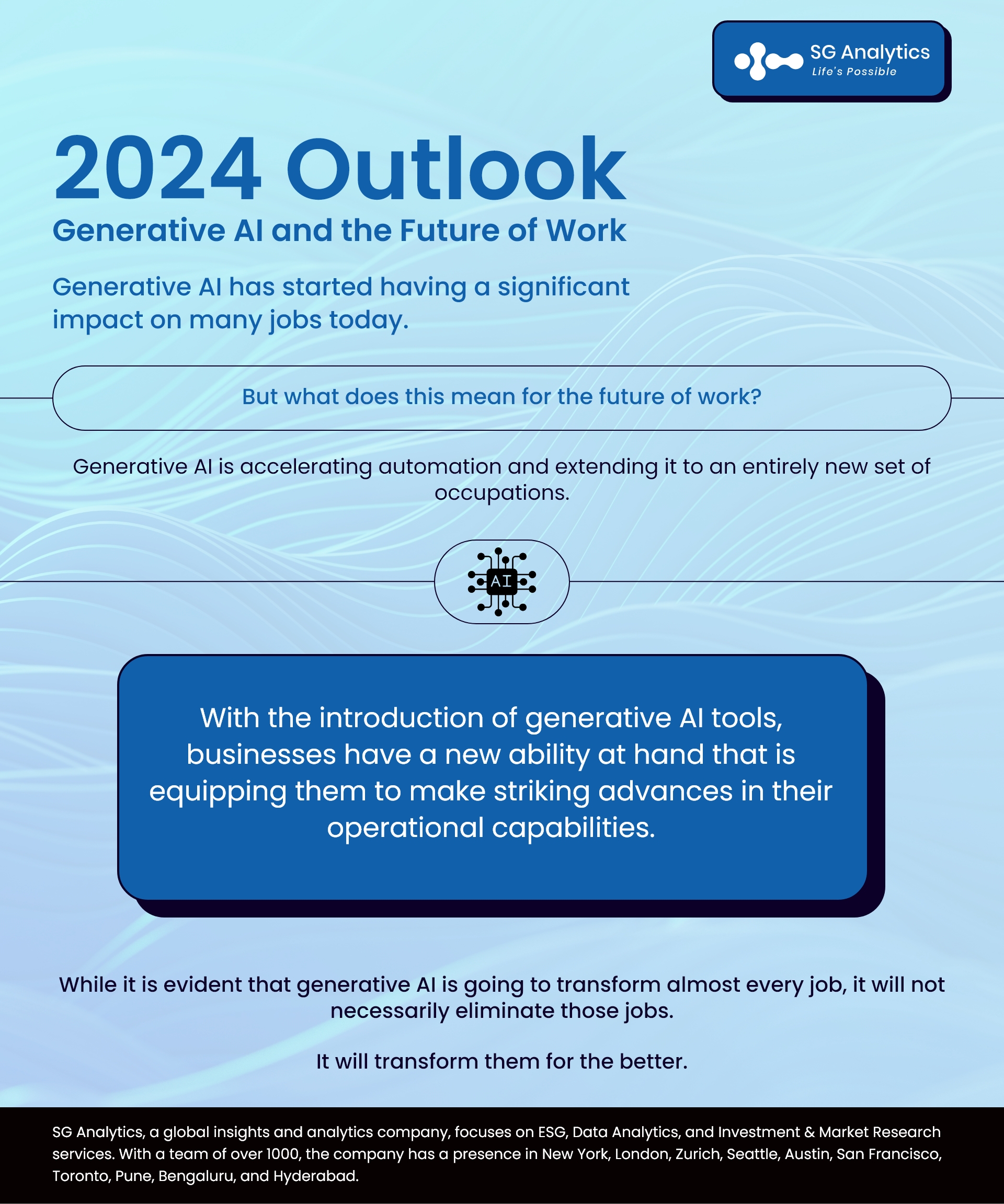Generative AI has started having a significant impact on many jobs today. But they are not being affected equally. Organizations are increasingly witnessing that certain operations are being changed more than others.
However, if a job can be done remotely or involves software development, there is a much higher chance that the integration of AI will augment the work or make it redundant.
But what does this mean for the future of work?
On one hand, most jobs are highly likely to be transformed by generative AI in a position of privilege. The ability to adopt generative AI into the workflow will enable organizations to make their operations efficient, productive, and valuable. On the contrary, many roles, such as doctors, lawyers, and software engineers, could be seen as leading toward growing inequality in society.
Read more: The Future of Generative AI: How Will it Change the World
The Evolution of Required Skills
Rather than needing new skills, the new trend is pointing towards evolving skills. However, enhancing technical skills and delegating routine elements of work to machines implies that employees will have more time to focus on the human aspect of their work.
For professions such as lawyers and doctors, this indicates spending more face time with patients and less time reading charts and reports. Teachers will also be able to spend less time grading papers and more time educating their pupils.

It is also critical to note that employers are responsible for helping with this evolution. It is in the interest of their employees that they benefit from personal development. However, it is also in the interest of businesses that will further experience growth due to the advances in efficiency and innovation driven by the adoption of generative AI.
The Effects of Automation and Generative AI
From industrial robots to automated data processing systems, generative AI is emerging as the biggest factor in changing the demand for various occupations. Generative AI is accelerating automation and extending it to an entirely new set of occupations. While technology is advancing rapidly, many other forces are also affecting the demand for labor. Organizations are expecting to witness significant shifts in the occupational mix.
Read more: The Impact of Generative AI in Revolutionizing Market Research
And with the recent introduction of generative AI tools, businesses have a new ability at hand that is equipping them to make striking advances in their operational capabilities.
While generative AI is still in the early stages, it holds the potential to make significant and wide-ranging impacts on businesses and their operations. Generative AI is being used to write code, design products, create marketing content, streamline operations, and accelerate scientific discovery. All of this implies that automation is about to influence a wider set of work activities involving expertise, interaction, and creativity.
The occupational categories exposed to generative AI could continue to add jobs through 2030, although its adoption may slow the rate of growth. The biggest impact for knowledge workers is that generative AI will change their mix of work activities significantly. And while automation may take hold, investment and structural drivers are likely to support employment.

Tackling Structural Issues
Filling future jobs is an opportunity to make the labor market more inclusive. Employers will have to reconsider the necessary credential requirements. With critical social infrastructure in place, organizations will be able to handle their training requirements along with the magnitude of the reskilling challenge with industry groups, educational providers, and nonprofits. Meeting these growing needs will hinge on upgrading the quality of jobs and advancement opportunities.
Read more: Big Ideas that Will Change the World in 2024
With millions of jobs potentially being eliminated due to the emergence of generative AI and even more being created in fields requiring different skills, organizations need to access the bigger picture and incorporate measures to help individuals find opportunities for growth. With many initiatives in place, it is critical for them to dramatically scale up what works and proactively fill key shortages. One promising solution involves digital learning and employment records to document individual employees and their skills acquired over time.
Understanding the Impact of Generative AI
Today, it is easier to assess the impact of generative AI on individual skills rather than on the entire job profile. The integration of generative AI holds the potential to exacerbate existing inequalities that can only be addressed by continued focus on improving opportunities. This implies offering professionals the chance to move into positions regardless of economic, social, class, or gender grouping. It’s also vital to ensure that aspects of human behavior critical to day-to-day well-being are not being augmented.
But with the impact of AI, there will also be ethical considerations that cannot be ignored. The changing nature of work, along with income disparity between roles and the intrinsic need for human-centric services across different professions, all will need to be addressed.
Read more: Integrating the Power of Generative AI for Transformative Leadership

Final Thought
Generative AI will largely affect roles where many of the skills can be augmented or automated. While it is evident that generative AI is going to transform almost every job, it will not necessarily eliminate those jobs. It might just transform them for the better.
Businesses and governments alike will benefit from this emergence of generative AI in a safe and ethical way. But for that, organizations will have to first undertake a balanced evaluation of how this will happen. Transforming the way existing jobs function will lead to the creation of many new jobs as well. And many industries have already started to experience this, with openings appearing for positions like AI engineer or AI auditors.
While the impact of generative AI on jobs is only set to grow over the coming year, organizations need to paint a better picture of how it will impact their operations as well as society and the measures they will integrate to overcome these important challenges. The most important thing for them to undertake is to develop an understanding of how the organizational roles will further benefit from this hugely transformative opportunity.
SG Analytics, recognized by the Financial Times as one of APAC's fastest-growing firms, is a prominent insights and analytics company specializing in data-centric research and contextual analytics. Operating globally across the US, UK, Poland, Switzerland, and India, we expertly guide data from inception to transform it into invaluable insights using our knowledge-driven ecosystem, results-focused solutions, and advanced technology platform. Our distinguished clientele, including Fortune 500 giants, attests to our mastery of harnessing data with purpose, merging content and context to overcome business challenges. With our Brand Promise of "Life's Possible," we consistently deliver enduring value, ensuring the utmost client delight.
A leading enterprise in Generative AI solutions, SG Analytics focuses on unlocking unparalleled efficiency, customer satisfaction, and innovation for the client with end-to-end AI solutions. Contact us today to harness the immense power of artificial intelligence and set new benchmarks in operational efficiency, customer satisfaction, and revenue generation.
About SG Analytics
SG Analytics is an industry-leading global insights and analytics firm providing data-centric research and contextual analytics services to its clients, including Fortune 500 companies, across BFSI, Technology, Media and entertainment, and Healthcare sectors. Established in 2007, SG Analytics is a Great Place to Work® (GPTW) certified company and has a team of over 1100 employees and has presence across the U.S.A., the U.K., Switzerland, Canada, and India.
Apart from being recognized by reputed firms such as Analytics India Magazine, Everest Group, and ISG, SG Analytics has been recently awarded as the top ESG consultancy of the year 2022 and Idea Awards 2023 by Entrepreneur India in the “Best Use of Data” category.









